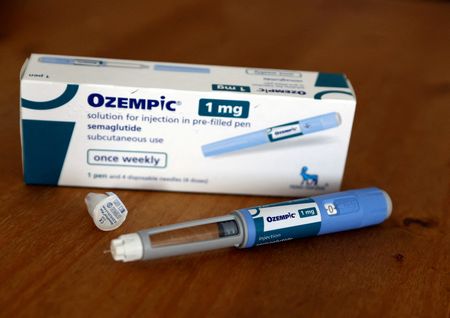By Stine Jacobsen and Maggie Fick
COPENHAGEN (Reuters) – Novo Nordisk’s widely used diabetes drug Ozempic delayed progression of chronic kidney disease in diabetes patients, a large late-stage study found, cutting the risk of death from that and major cardiac events by 24%.
The trial results are the latest indication that drugs from the GLP-1 class, which suppress appetite by mimicking gut hormones, have medical benefits for conditions beyond type 2 diabetes and weight-loss, their initial purposes.
Around 40% of people with type 2 diabetes have chronic kidney disease and some 700 million patients are affected globally, according to the Danish drugmaker.
Novo stopped the trial in October, almost a year ahead of schedule, because it was clear from an interim analysis that the treatment would succeed.
“The trial achieved its primary endpoint by demonstrating a statistically significant and superior reduction in kidney disease progression as well as cardiovascular and kidney death of 24% for people treated with semaglutide 1.0 mg compared to placebo1,” Novo said in a statement on Tuesday.
Novo’s shares, up 24% this year, are at record highs on surging demand for its highly effective diabetes and weight-loss drugs that are based on the active ingredient semaglutide. The drugmaker became Europe’s most valuable listed company last year.
Its shares were down 1.3% at 1244 GMT, after hitting a record high in early trade.
The 24% reduction in the risk of kidney disease-related events was slightly below some investors’ expectations, analysts from Sydbank and Jefferies said.
Barclays analysts said they expect more details on the trial results when the company hosts its capital markets day on Thursday.
The trial called FLOW started in 2019 and involved roughly 3,500 patients with type 2 diabetes and moderate to severe chronic kidney disease, who were given 1 milligram (mg) of once-weekly semaglutide in addition to standard care.
“The positive results from FLOW demonstrate the potential for semaglutide to become the first GLP-1 treatment option for people living with type 2 diabetes and chronic kidney disease,” said Novo’s head of development, Martin Holst Lange.
Shares in dialysis companies DaVita and Fresenius Medical tumbled last year after Novo announced the early trial success. The dialysis market has for decades been sustained by high rates of obesity and diabetes, which contribute to kidney damage.
Shares of DaVita and the U.S. listed shares of Fresenius Medical were up nearly 8% and 12% respectively in U.S. premarket trading hours after the Novo data.
Fresenius has previously said that a reduction in cardiovascular death, a major risk for patients suffering from chronic kidney disease, could potentially lead to more patients surviving to reach a stage where they need dialysis.
Shares of Baxter International, which provides dialysis services through its kidney care unit, rose 5.4% to $44.8 in premarket hours.
The potential for GLP-1s to treat health problems beyond diabetes and obesity has hit shares in providers of bariatric surgery to treat obesity, food firms and glucose-monitoring device makers.
Semaglutide is also the active ingredient in Novo’s powerful weight-loss drug Wegovy. Both belong to a class of drugs known as GLP-1 analogues, which mimic hormones and in turn reduce appetite and increase the feeling of fullness after eating.
Ozempic is not currently in shortage in the United States, though Wegovy is. Last year, the British government declared a shortage of semaglutide, citing off-label use of Ozempic for weight-loss as a driver of the problem.
Novo said it plans to submit an application to EU and U.S. regulators for a label expansion for Ozempic this year.
Novo is not the only one testing a diabetes therapy from the GLP-1 drug class for additional medical benefits.
Rival Eli Lilly is currently enrolling patients for a planned trial of whether its drug, tirzepatide, can help fight chronic kidney disease in obese people with or without type 2 diabetes.
Tirzepatide is the active ingredient in Lilly’s diabetes drug Mounjaro and the weight loss version of that drug, which launched in December in the United States as Zepbound.
(This story has been corrected after the company corrected its earlier information to say that Ozempic cut the risk of death from kidney disease and major cardiac events in diabetes patients by 24%, in paragraph 1 and 5)
(Reporting by Stine Jacobsen and Maggie Fick, additional reporting by Bhanvi Satija in Bengaluru and Ludwig Burger in Frankfurt; Editing by Josephine Mason, Terje Solsvik, Alexander Smith and Susan Fenton)

